The Tory general election candidate for Wimbledon, Danielle Dunfield-Prayero, is campaigning hard on being a local. Even though it doesn’t seem to be true.
Read more: A local seat for local people
When does living 40 miles away from somewhere allow you to claim it’s “home” and that you’re a “local”? For one Tory candidate at the next general election, the answer seems to be: if your spouse went to primary school there.
In April, I received a newsletter (mysteriously coloured red) from the Tory candidate for the constituency of Wimbledon – where I live. On the front page, Danielle Dunfield-Prayero – a former financier and international triathlete – was described as a “local candidate.”
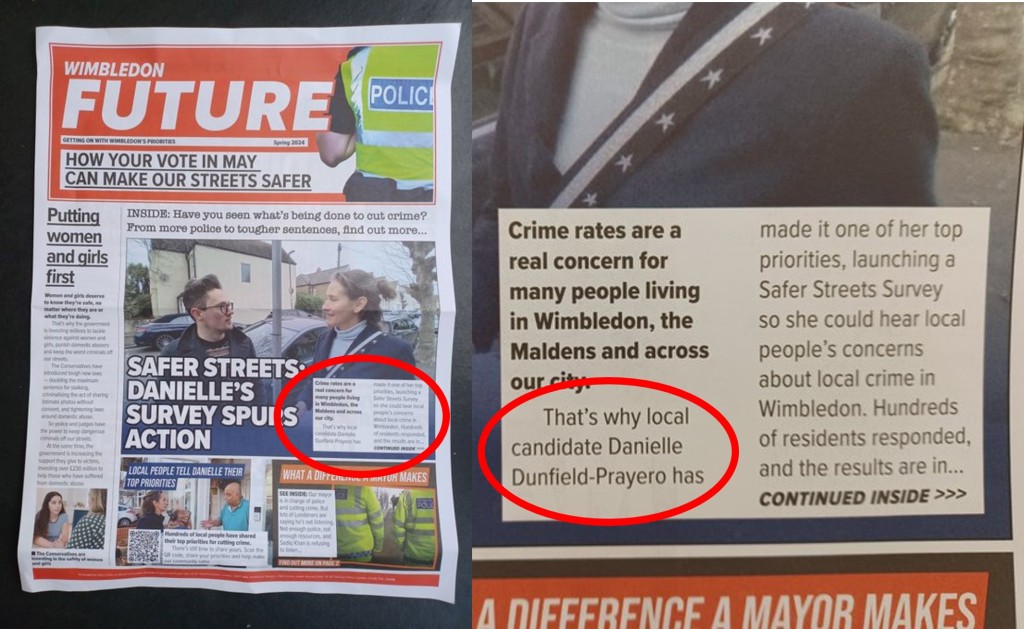
Elsewhere in the newsletter, the local angle was repeatedly reinforced. “Local people tell Danielle their top priorities.” Dunfield-Prayero is “our new local candidate.” “Local police,” “local people,” “local police.”
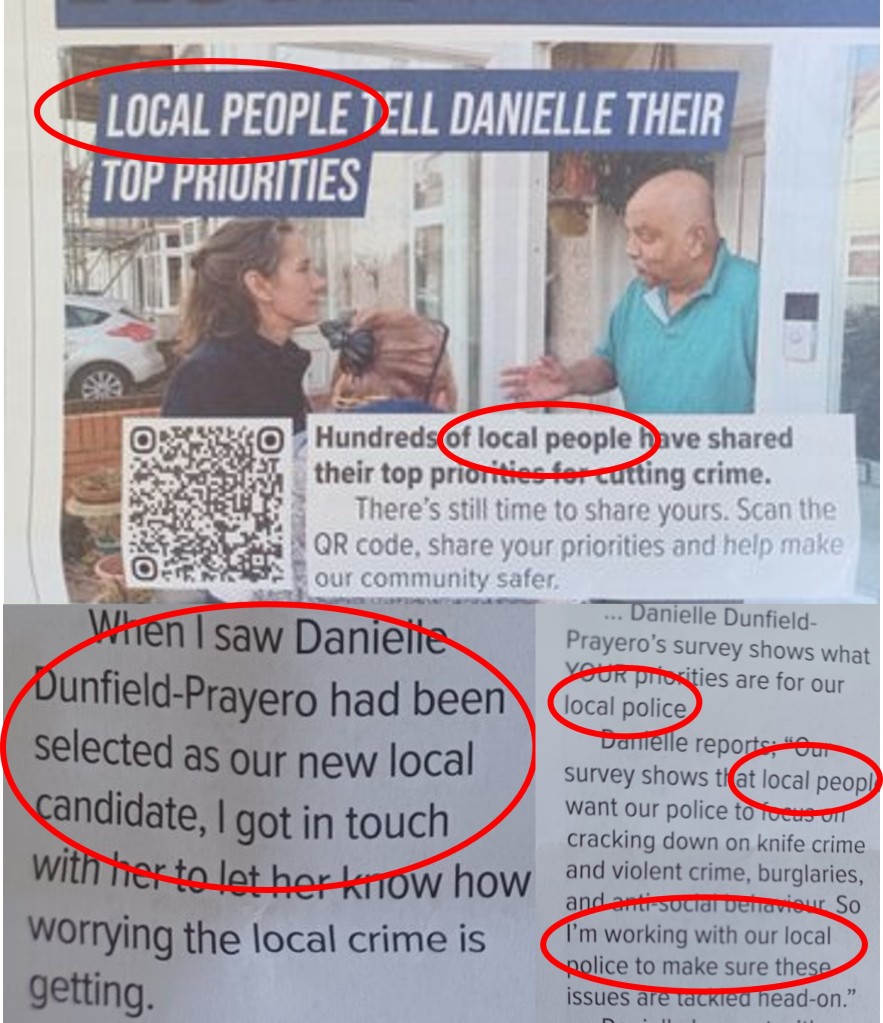
The message has been a consistent theme in all her communications. On her Twitter profile, Dunfield-Prayero has her location marked as “Wimbledon” and her pinned tweet has a campaign video, in which she extols Wimbledon’s virtues. In it, she explains how she and her family find “solace in Wimbledon’s green spaces”. She goes on to say that, “Like many, I’ve lived abroad, but Wimbledon’s charms always draw me back home.” [Emphasis added.]
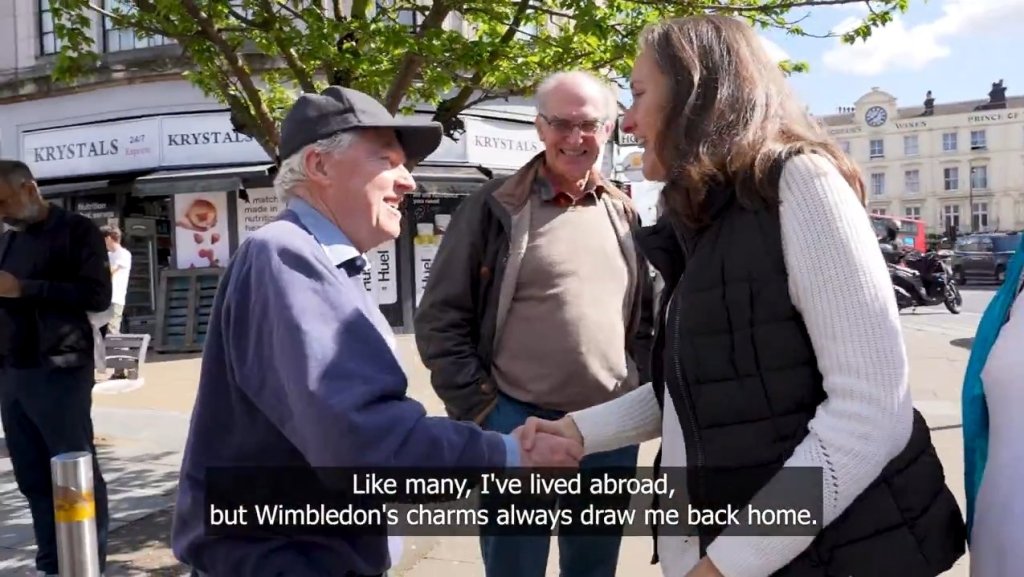
Dunfield-Prayero’s campaign website plays up her local connections even further, explaining that her husband was born and brought up in Wimbledon and that her father-in-law is a church elder there.
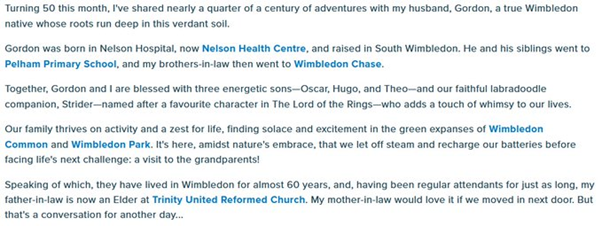
But while Dunfield-Prayero’s in-laws are evidently Wimbledon locals, there is, curiously, no similar detail in her personal statement to substantiate her claim to be so. Nowhere in her campaign material does Dunfield-Prayero disclose where she lives or works, where her kids go to school, where she goes to church etc.
I think, by now, you can probably guess where this is going.
From what I can tell, Danielle Dunfield-Prayero is not a Wimbledon local and has never called it home. Instead, it appears that she lives in the Chichester area, more than 40 miles southwest of Wimbledon.
In 2020, Dunfield-Prayero became the Deputy Chair (Political) of Chichester Conservatives. It was there that she met current Chichester MP and cabinet minister Gillian Keegan, who has supported her bid to retain Wimbledon for the Conservatives. (When celebrating International Women’s Day in 2021, Keegan cited Dunfield-Prayero as an example of a “local female leader doing great work.”) When her selection was announced, Dunfield-Prayero’s other big endorsement came from Andrew Tyrie, who said how much her valued the work she had done for him when he was an MP. Tyrie was MP for Chichester from 1997 to 2017, before becoming Baron Tyrie of Chichester in 2018.
According to Companies House, Dunfield-Prayero has been a director of three Chichester-based non-profits, one of which – The Great Sussex Way (formally Visit Chichester) – provides her day job as CEO. It was in this capacity, in February 2023, that Dunfield-Prayero wrote passionately about the importance of shopping locally, saying, “There’s so much going on now in Chichester, come down and see for yourself.” She had written a similarly toned piece in June 2022, where she said, “We all have a part to play in supporting our area.” Before that, in late 2021, she spoke on an “Invest Chichester“ Zoom seminar in which she said that Covid lockdown had brought home to her just how magnificent the countryside around Chichester is. In fact, Dunfield-Prayero is such a pillar of the Chichester community that, in November 2023, she was invited to become a governor of the Chichester College Group, an appointment with a four-year term of office.

Dunfield-Prayero’s ties to the Chichester area go back further than this, however. In 2015, she stood for election to Chichester District Council in the Midhurst ward. Her election leaflet included the claim that she was “the local choice” – that word again – and that family were “proud members” of the Midhurst gym.
She also said, quite surprisingly for a Wimbledon local that, “Danielle married in Fernhurst and after working abroad has returned to contribute her expertise to the community, making this area her permanent home.” [Emphasis added.] Fernhurst is, according to Wikipedia, “a village and civil parish in the Chichester district.” (Despite these strong local ties, she didn’t win.)
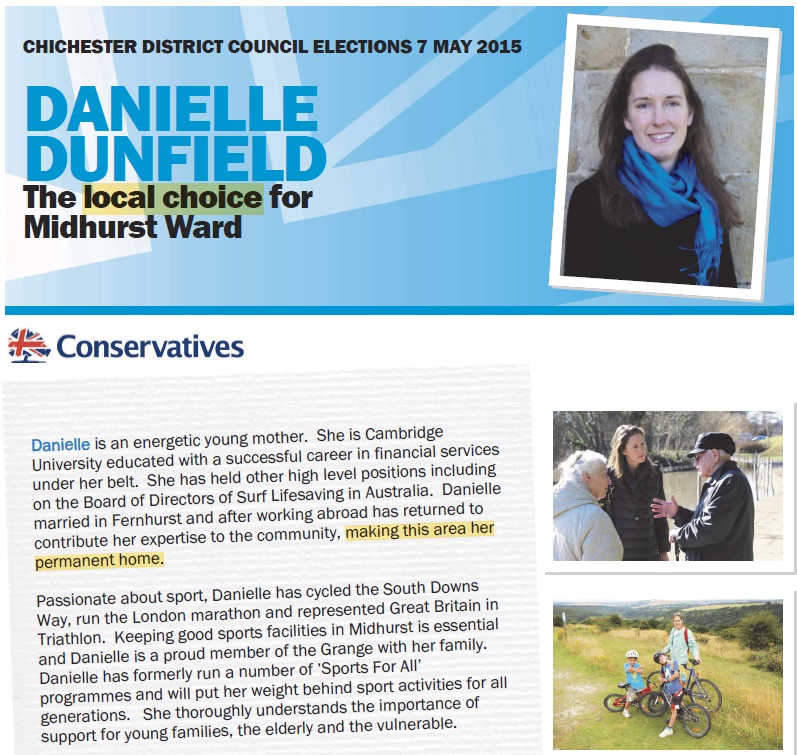
Perhaps most problematically of all, however, for Dunfield-Prayero’s claim to be a “Wimbledon local” is that, when she was selected as Conservative candidate for the constituency, the blog Conservative Home noted that her selection was unusual because, “she is not a Wimbledon local.” In a similar vein, legendary political journalist Michael Crick, who runs a project cataloguing general election candidates, described Dunfield-Prayero as a “[contender] from outside the [constituency].” Liberal Democract peer Chris Rennard, meanwhile, called her, “Chichester’s choice for Wimbledon.”
So how might these three observers from such different parts of the political spectrum have come to the same conclusion? Could it be by reading Dunfield-Prayero’s now deleted selection campaign website, which was reported to include a section on the importance of family, in which she disclosed that, “I live in Haslemere with my husband and our three sons”?
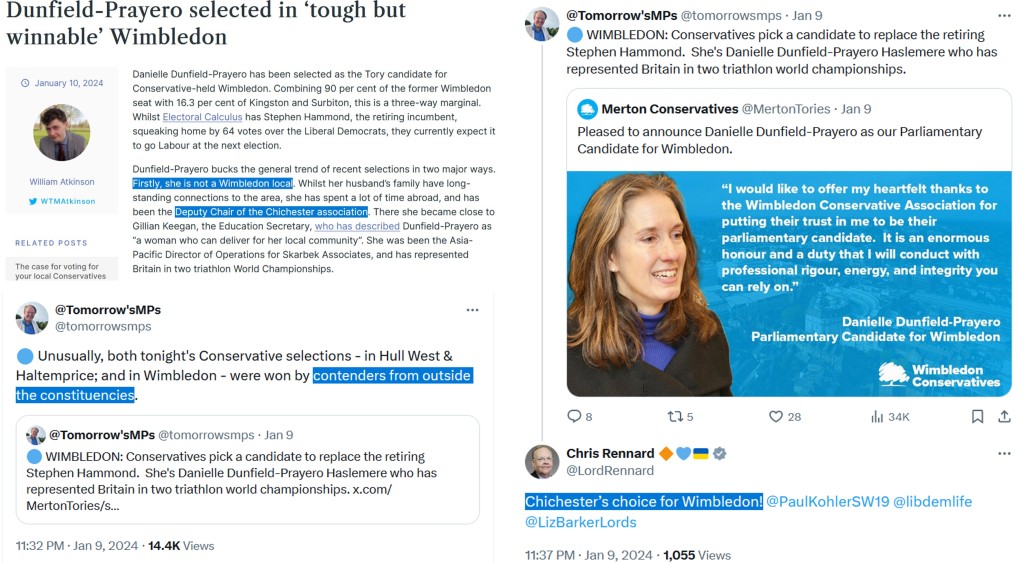
Danielle Dunfield-Prayero, then, is a “local candidate” for whom Wimbledon is “home”, despite not seeming to live there, working in Chichester, calling a village near Chichester her “permanent home” and being described by the most important Tory news site as “not a Wimbledon local.”
From what I can tell, her claim to be local appears to rest almost entirely on where her husband’s family live. Which might explain why, for the early months of her campaign, she conspicuously avoided actually saying that she lived in Wimbledon, letting the words “local” and “home” – along with her in-laws’ connections – do the heavy lifting.
Could this all be an innocent mix-up? Perhaps an over-enthusiastic member of the campaign team went a bit far with the “local” language, with no genuine intent to mislead anyone.
On her website, Dunfield-Prayero says, “Let’s face it, politics as usual has left many feeling disillusioned and disenchanted. I share the sentiment that it’s time for a different approach. And that’s where I come in. I want to do politics differently.”
Seeking evidence of this different approach, I emailed Dunfield-Prayero several times to ask her to explain on what basis she was pitching herself as a local. I did not hear back from her.
This week, however, when questioned on Twitter by a constituent about her ties to Wimbledon, Dunfield-Prayero went further than she had before, saying, “I do not now nor indeed have I ever lived in the Chichester area… I live in South Wimbledon.”
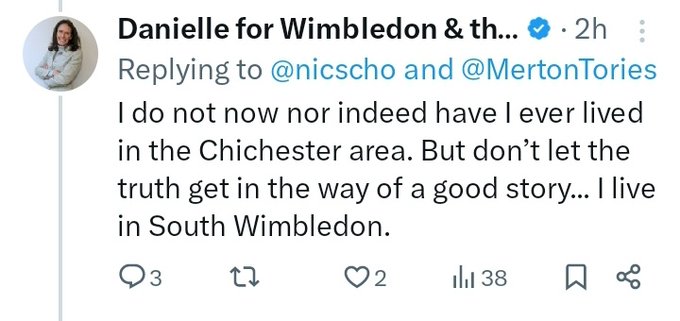
This caught my attention because, instead of a vague hint, this is testable, factual claim.
And the problem with Dunfield-Prayero saying that she has “[never] lived in the Chichester area” is that, since 2015, she and her husband have owned a house in a hamlet near Fernhurst. It was to here that she moved shortly after she stood for Chichester District Council as a “local choice,” in the area she called her “permanent home.” The house is in the Chichester parliamentary constituency.
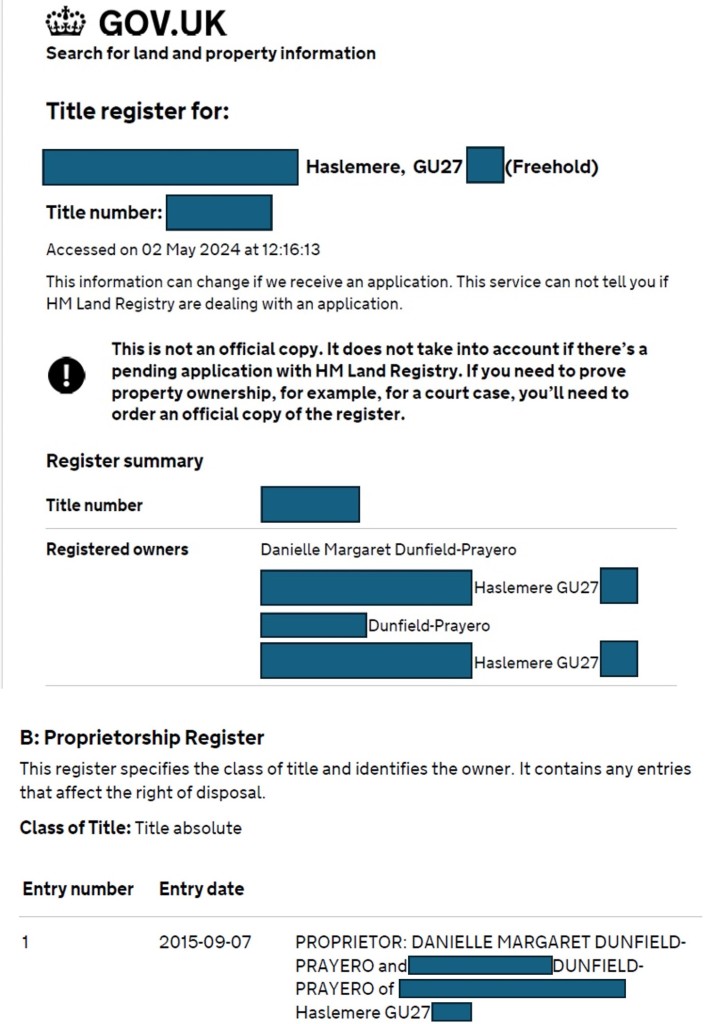
Unless the house has been sold recently enough that it doesn’t yet show on the Land Registry, she remains its owner with her husband. It doesn’t appear to have been advertised for sale or rent since they bought it and, as recently as August last year, she joined the residents’ Facebook group of a town just three miles from the house. Her husband, who owns a consulting firm, also gives the house as his contact address on Companies House. By law, this must be accurate and up to date. Between 2020 and 2022, Dunfield-Prayero was a minority shareholder in the company. The address she gave – which again, by law, must be accurate – was the same as her husband’s.
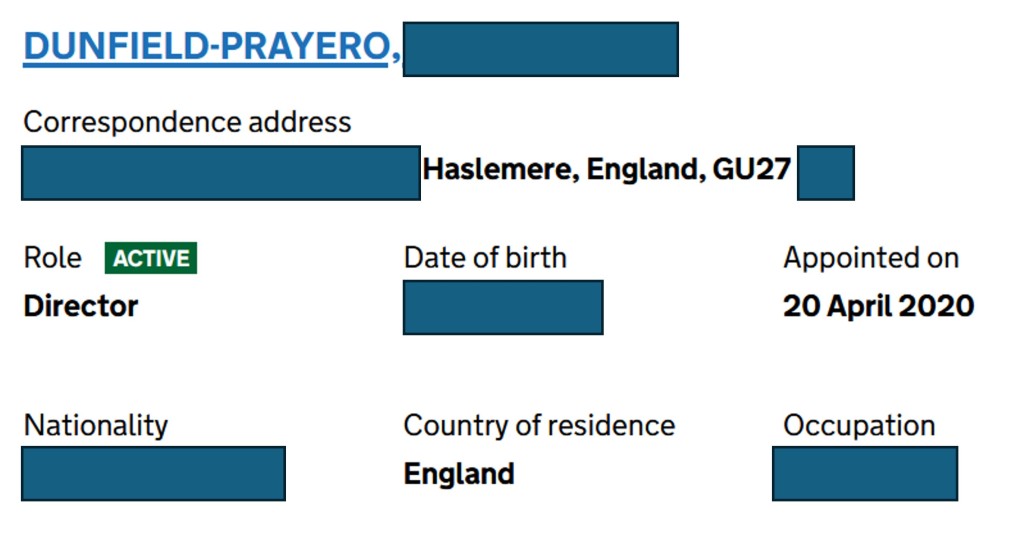
It’s hard to know what, other than that Dunfield-Prayero may not consistently have told that truth, could explain this discrepancy and reconcile the seemingly different claims that the candidate has made for where she lives in her two election campaigns. Even if, for example, she had bought the house and never actually lived in it – making her more recent claim accurate – that would cast doubt on her 2015 claim to be a Midhurst ward “local choice” and “permanent resident.”
It is also possible that one could argue that having a house in the most northern part of the Chichester parliamentary constituency might place one outside the “Chichester area”. But given Dunfield-Prayero’s extensive ties to Chichester in her work and her political life, I don’t think I would find this a very convincing argument. You might feel differently.
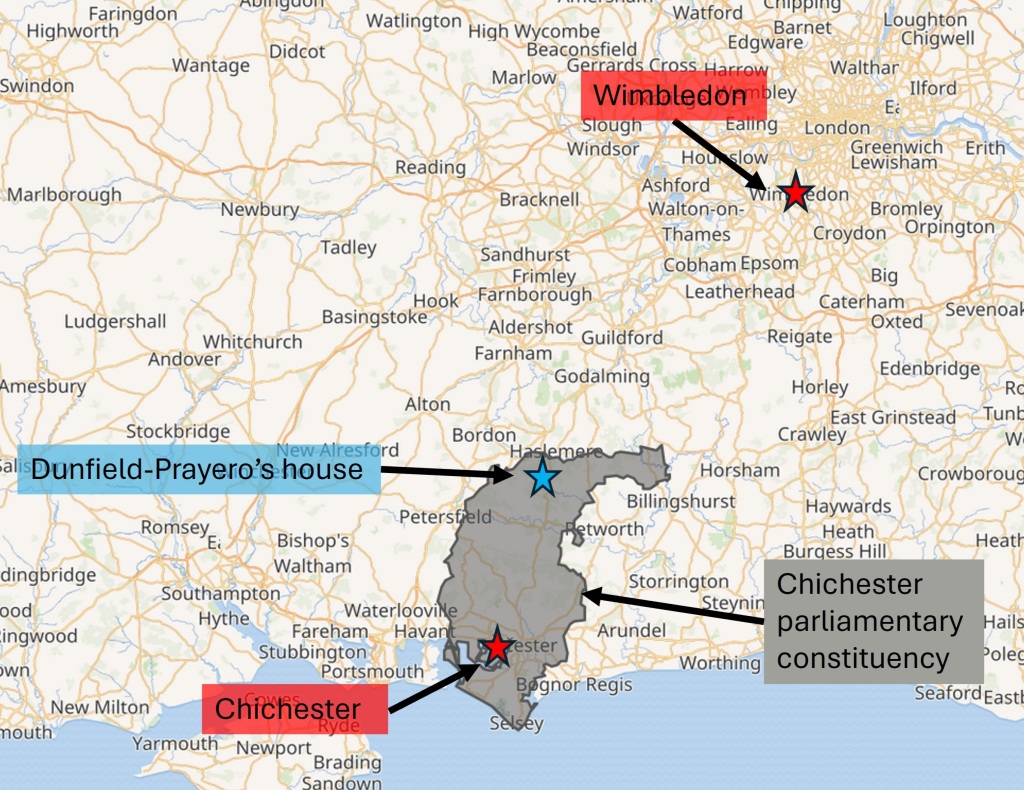
While the candidate’s recent claim to “live in South Wimbledon” might seem cut-and-dried, in the absence of further detail, it’s a more ambiguous statement than it might first appear. It’s not uncommon, for example, for would-be MPs to stay with friends or get a short-term let for the duration of an election campaign – so they can devote as much time to canvassing as possible. And in such a situation, it would be very easy to claim that you “lived” in the constituency. But that’s not the same as it being your long-term, primary residence – which, in the case of Dunfield-Prayero, is what I think many people would interpret her claims to be a “local” and to “live in South Wimbledon” as meaning. (Especially when paired with her denial of her connections to the Chichester area.)
In one sense, all of this is ridiculous and unimportant. Many people will think, as I do, that where someone comes from shouldn’t matter. It’s talent and character that count. But I also think honesty is paramount and so where Dunfield-Prayero comes from is an issue as long as she chooses to make it so. (Indeed, by the frequency with which her comms push the local angle, it seems reasonable to believe that she thinks that where a candidate comes from matters a great deal to Wimbledon voters. Perhaps because the candidates for the other main parties appear to have strong ties to the area.)
Having tried and failed to get someone on the phone at Dunfield-Prayero’s campaign office several times, I managed to speak to someone this week. I was told that they could only deal with local and mayoral election queries and I would have to email in my questions. I did – again – asking for an explanation as to how it makes sense to say that Dunfield-Prayero has never lived in the Chichester area and when it was that South Wimbledon became her primary residence.
As with my previous email, I have yet to hear back.
Until I do – and in the absence of a convincing account from Dunfield-Prayero – the explanation that makes most sense to me is that the Tory candidate for Wimbledon is, even if only inadvertently, misleading voters by trying to present herself as being local when she is not.
For now, I find myself agreeing with the person who said that “politics as usual has left many feeling disillusioned and disenchanted” and that we need to do “politics differently.” However, it doesn’t look like the Tories will be leading the way on this – in Wimbledon at least – in 2024.
——————————————————————
UPDATE: So many additional pieces of evidence of Dunfield-Prayero’s ties to the Chichester area have come to light since I first began researching this piece, making it an ever-longer read, that I thought it might be helpful to collate the key ones into a factsheet (see below).
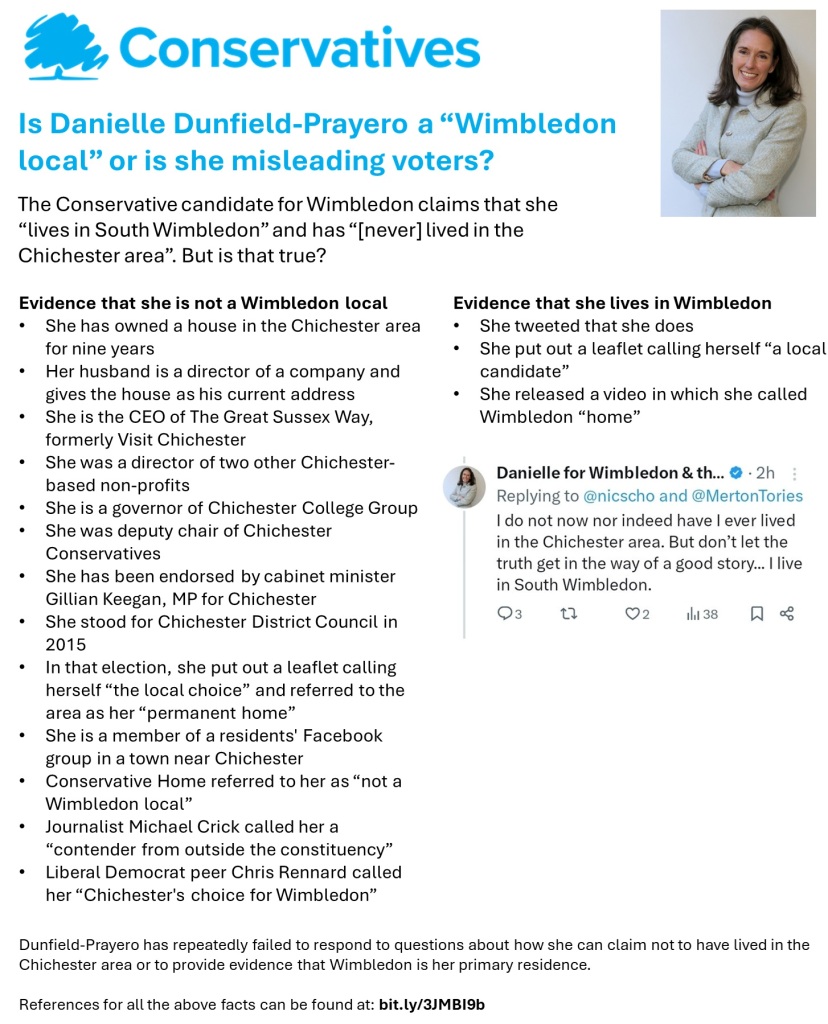
FURTHER UDPATE: Having not heard from the candidate, I wrote a letter to Merton Conservatives, the local branch of the Tory party, which selected her. In it, I set out my concerns about Dunfield-Prayero’s campaign and requested a statement on whether they backed her claims about herself. I have not heard back from them. But I did get a response of sorts from Dunfield-Prayero: she blocked me on Twitter.
UPDATE (04/06/24): Remarkably, Dunfield-Prayero has again claimed never to have lived in the place where she has owned a home for nine years, employing the exact same formulation as before: “I do not now nor indeed have I ever lived in the Chichester area. I live in South Wimbledon.” ——————————————————————
Martin Calladine
If you enjoyed this piece, please consider buying a copy of my new book, No Questions Asked: How football joined the crypto con. You can get a copy here and you can read the first chapter here. Please also let other people know who you think might also be interested. Many thanks.